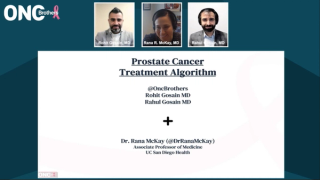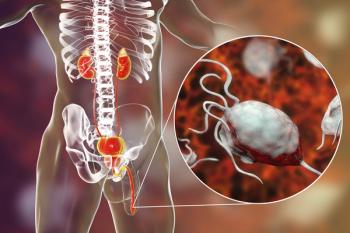
Prostate Cancer
Latest News
Video Series

Latest Videos
Shorts





Podcasts
CME Content
More News

Ash Tewari, MBBS, hopes that with institutional partner aid, in 10 years, 1 million men will undergo prostate cancer screening through mobile units.

The phase 1 ARTISAN trial investigators plan to expand enrollment to patients with metastatic CRPC outside the US in the second half of 2026.

Patients with low-risk prostate cancer who have a BMI of 30 or greater experienced a potentially harmful effect after receiving metformin.

A total of 33% of patients with advanced prostate cancer receiving the combination therapy remained progression-free per PSA after 1 year of treatment.

Findings from the phase 3 TRITON3 trial evaluating rucaparib in adult patients with metastatic BRCA-mutated CRPC supported the regulatory decision.

Data from the phase 3 AMPLITUDE trial support the approval of niraparib plus abiraterone acetate and prednisone for this metastatic CSPC population.

Data from a prospective study showed that the IsoPSA prostate cancer test outperformed total PSA and free PSA in men 50 years or older with elevated PSA level.

Results from the phase 1b ENGAGER-PSMA-01 trial showed deep PSA reductions and a favorable CRS profile among patients with taxane-naive CRPC.

In the 177Lu plus SBRT arm, the median PFS was 17.6 months vs 7.4 months in the SBRT alone arm for patients with oligorecurrent HSPC.

Subgroup data from the ARASENS trial support darolutamide plus androgen deprivation therapy as a standard of care in metastatic HSPC regardless of age.

Treatment with MCS-8 yielded no serious adverse effects among patients at a high risk of developing prostate cancer.

Data from a phase 2 study support further development of sacituzumab tirumotecan plus pembrolizumab in metastatic castration-resistant prostate cancer.

The PSA response rate and radiographic PFS were similar with the 177Lu-based combination regimen vs the radiotracer alone in metastatic CRPC.

Previous results from the study found improvement in the primary end point of PSA-PFS with apalutamide in recurrent prostate cancer.

Findings from the PSMAddition trial support the benefit of the early addition of lutetium Lu 177 vipivotide tetraxetan in metastatic HSPC.

Findings from the ENZARAD trial support adding enzalutamide to androgen deprivation therapy for those with positive lymph nodes.

At 8 years follow-up, patients with recurrent prostate cancer in the enzalutamide/leuprolide arm had an OS rate of 78.9% vs 69.5% vs leuprolide alone.

Capivasertib plus abiraterone shows consistent benefits across clinical end points in the phase 3 CAPItello-281 trial.

Updated safety findings may support the ARASAFE regimen as a potential standard of care in metastatic hormone-sensitive prostate cancer.

The novel PET imaging agent detected significantly more PSMA-positive prostate cancer lesions vs SOC in patients with low PSA levels.

Data from the AMPLITUDE trial may support widespread genomic testing at diagnosis to inform targeted therapy strategies for those with CSPC.

The 10-year biochemical DFS rate was 86% with EBRT plus focal boost vs 71% with standard EBRT in those with intermediate- and high-risk prostate cancer.

Imaging developments have made it possible to detect nodal recurrence at low PSA levels, which could help guide salvage approaches for prostate cancer.

RLT-based combinations, RLTs across genitourinary cancers, and RLTs in earlier lines of therapy are among the considerations for further research.

Grade 2 or higher genitourinary acute toxicity was observed in 27.3% of patients treated with 2 fractions of SBRT vs 29.2% of patients treated with 5 fractions.



















































